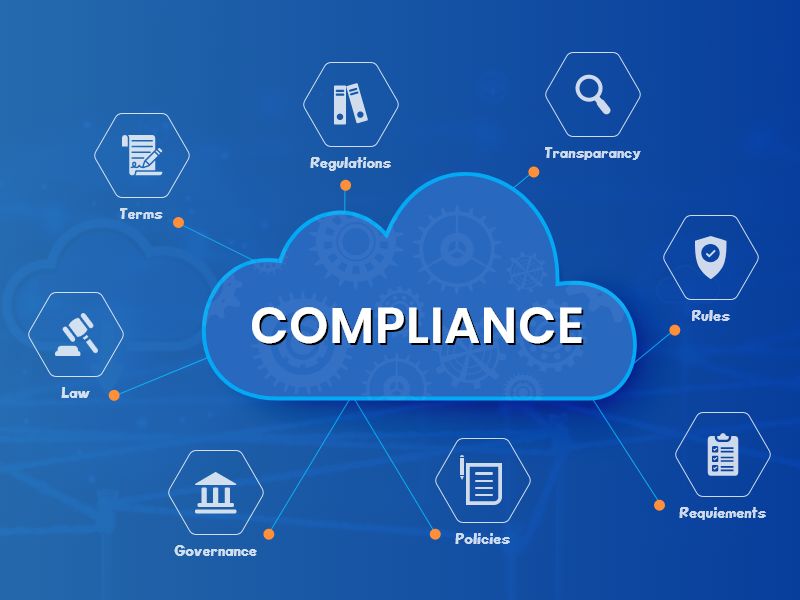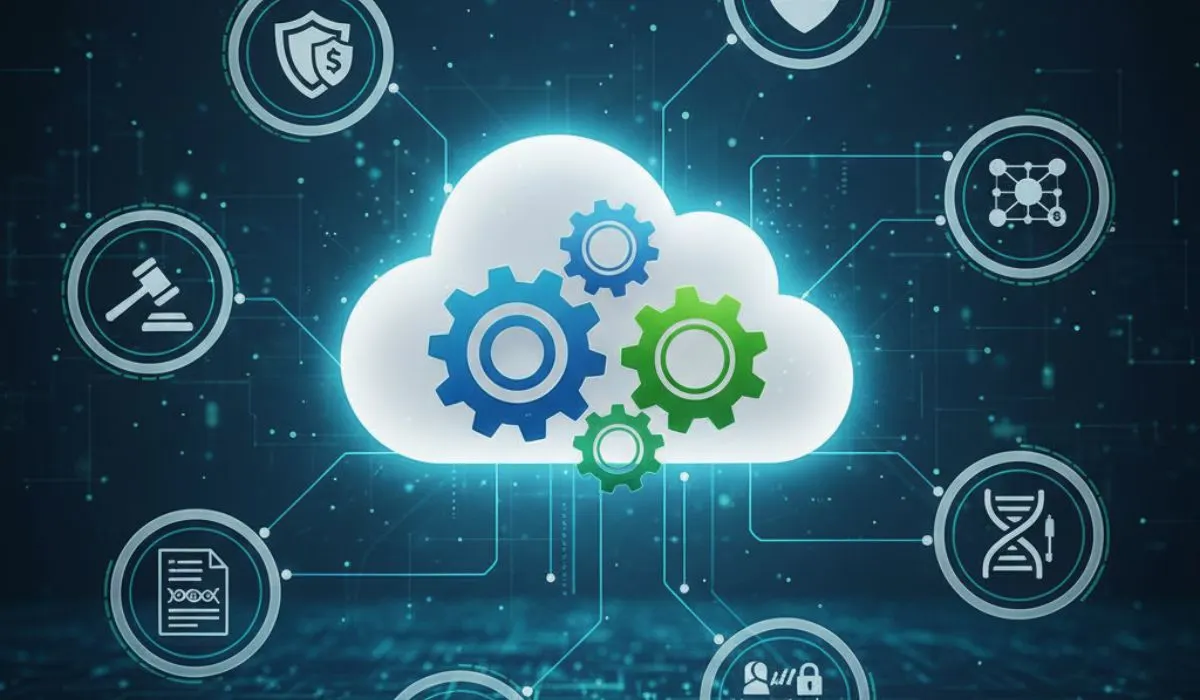Cloud computing compliance and regulations is basicially the rules and guidelines that help businesses to protect data when using cloud services. These rules make sure that companies to use, store and share information in a safe and legal way. As more companies move to digital platforms so these rules is important to build trust, honestly and responsibility with accountability. These regulations help to protect data from being misused or hacked. In simple terms cloud compliance means that companies must follow local and international rules to protect user data, personal leaks, and increase safe online behaviour. Now We will study its importance, regulatory requirements, data protection laws, cloud security compliance, challenges and risk management
Understanding cloud competence in simple terms
Cloud compound is now days is not optional but It’ s knowledge is must. It helps companies to knows how to connect, store and use data in a way that follows the law. Both cloud services providers for example Google cloud and clients (the companies that use these services) share responsibility…Cloud providers must offer safe and secure system. Client must set up access and use the cloud correctly. Some important international framework include:
- ISO/IEC 27001 – set global security standards
- GDPR – protect personal data in Europe
- HIPAA – protects health data in the US.
- SOC 2/check data protection and privacy and services.
Following the standard, it’ s not just about loss – it shows customer that their data at safe and builds trust.
Why Cloud Compliance in Important
Cloud security compliance means following safety rules that keep data safe while it’ s being stored, send, or processed in cloud It includes:
- Using encryption to lock data
- Setting up access control( who can see or use data)
- Running monitoring systems to catch problem early .
- Doing regular security checks and employment training
These help stop:
- Unauthorised access
- Data loss
- Mistake made by human staff (a common cause of data leaks)
By focusing on security at every step, businesses create a safe digital space and show customers that their information is protected.
Read Also:- AI Cloud Infrastructure: The Future of Smarter Computing
Regulatory Requirements for Cloud Computing

Different countries and industries have different rules for cloud computing. For example–
- GDPR (Europe)-focuses on user privacy and getting clear permissions before using personal data.
- HIPAA (USA)-protect patient and health information
- DPDP act (India)– the digital personal data protection act, 2023 ensures personal data is to safely and used responsibly.
If your company works in more than one country, it’ s very much important to follow all the local rules data protection crosses country borders in the cloud, so businesses must know:
- Where data is stored
- Who can access it?
Not following these tools can lead to huge finance, lawsuit, and all’ s loss of reputation of company and countries cloud security.
Data Protection Laws in Cloud Computing
Data protection laws are the most important roles in the cloud compliance. These laws say how companies must handle :
- Personal data
- Financial data
- Private or sensitive information
To follow these laws, companies must :
- Use a strong privacy policies
- Encrypted data
- Keep secure backup
- Ask for user permission before using their data
These laws don ’t just protect businesses – they protect people and people trust. They show that a company respect privacy and uses data in an honest and responsible way.
In India:
India’ s main law for cloud data is the digital personal data protection act (DPDP 2023). It says:
- Companies must clear permission from users.
- Data must be protected using encryption.
- Data can ’t be sent outside India without protection and permission.
- Both cloud providers and their customers are responsible for any missuse or leaks.
Cloud Security Compliance
The important part of compliance is Security. Cloud security compliance makes sure that the company’s technical and operational systems are strong enough to stop attacks or data leaks.
Some common areas include:
- Encryption of sensitive data.
- Access of data to authorised people only.
- Regular audits should be done to confirm that rules are being followed.
- There should be a clear and safe plan for incident response in case of a data breach.
Following these steps can show that they care about security of data and lower the risks from attackers.
Cloud Governance and Risk Management
Compliance is not just about following the law. It is also about managing risks inside the company. Cloud governance and risk management means finding possible problems and fixing them before they get worse. It involves setting up controls, policies, and monitoring systems to make sure everyone follow the rules.
This also includes:
- Explaining clear responsibilities for data security.
- Checking vendor compliance certificates before signing contracts.
- Watch for unusual behaviour
Management makes sure that compliance is working actively and is not treated as a onetime activity.
Challenges in following Cloud Compliance
Using cloud computing compliance and regulations is not always easy. Some common challenge include:
- Different rules in Different Countries
- Managing third-party vendors
- Keeping up with changing laws
- Avoiding human errors
- Balancing easy access with strong security
Though, companies that give priorities to compliance which help them to stop risks and improve long-term trust with clients.
Best Practices for Compliance in Cloud Computing
There are some measures which businesses can follow to solve these challenges and fulfil cloud computing compliance and regulations
- Audits: Having Regular audits can make sure that all systems are following the current laws for compliance.
- Trusted Vendors: Work only with cloud vendors who have required certifications like ISO 27001 or SOC 2.
- Encrypted data: Whether storing data or sharing it.
- Training: make sure employees know how to protect data.
- Regular Monitoring: Use cloud compliance tools that warn you of risks before time.
- Stay updated: Have a team to track new rules and update policies regularly to stay updated.
The Future of Cloud compliance
In the future, cloud competence ill use more smart technology :
- AI and automation will help monitor cloud system in real time.
- System will quickly fine and fix week points.
- Digital tools will make audits and reporting easier.
New laws will luckily focus on :
- usage of artificial intelligence (AI)
- Green and responsible data use
- Companies that already have a strong governance and compiling system will find it easier to grow safely in the future
Alternative practices of cloud compliance
Cloud technology is changing rapidly, and compliance will keep growing with it. As artificial intelligence and advanced analytics grow, new sets of rules will appear. Governments are already working on hard, combined global rules to manage cloud security.
Businesses can expect the future of regulation to focus on:
- Openness in how data is stored and shared.
- Stronger data protection between countries.
- Audit automation and regularly monitoring
- Being eco-friendly, requiring green practices to be done in cloud setup.
Those who adjust early will have an advantage in an open market
Read More:- Cloud Computing: Government's Digital Upgrade
Conclusion
Cloud computing compliance and regulations are about much more than just staying away from legal fines. They are important for protecting data, building customer trust, and working responsibly in an online world.
By connecting with cloud security compliance, meeting regular requirements for cloud computing, and strengthening rules for managing cloud use and risk management, organizations can grow forward confidently. Businesses that take compliance necessary will not only reduce threats but also earn customer trust and gain an edge over competitors. In modern business, compliance is not just a rule but it is a trust signal and a growth strategy.













